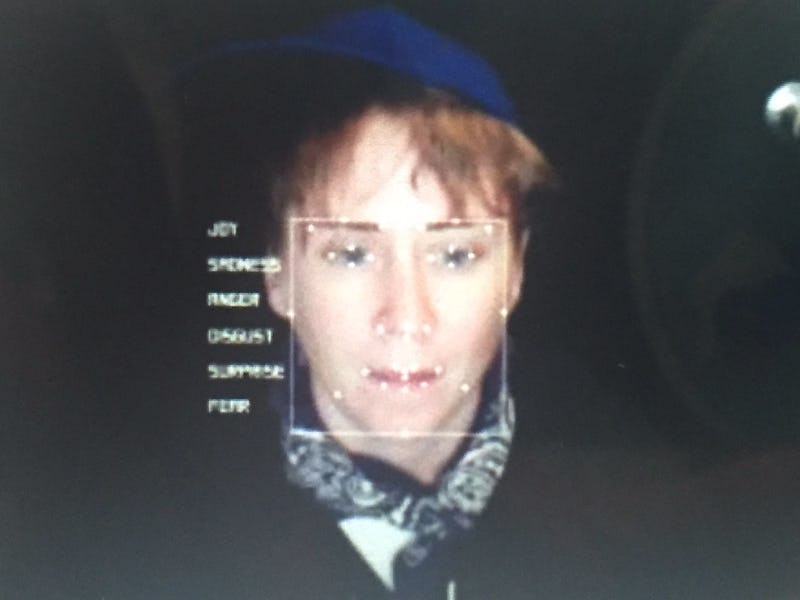This Company Wants to Know If You're as Optimistic as You Claim
Your body is a dead give-away that you're lying -- or telling the truth.

Think about the future. Do you feel hopeful about it? Pessimistic? Maybe how you’re really feeling in the moment isn’t what you’d say if asked.
Polygraph technology is notoriously unreliable and unusable as evidence in court. But as biometric data sensors become increasingly sophisticated, one company is convinced that it’s in the early stages of separating what we’re thinking from what we’re feeling.
Coffee, a New York-based tech company, has created technology that purports to measure the gap between what a subject says, intellectually, and how they feel, emotionally. They installed a small walk-in stall at the GOP Convention here in Cleveland on behalf of OppenheimerFunds, an investment firm, to unveil the tech as part of the festivities surrounding the convention. It’s been received by the crowds like a virtual reality ride at a county fair might be. People are totally into it.
Here’s how it works: Participants answer a series of questions on a tablet outside the walk-in stall. They were then taken inside, put on a smartwatch that captures biometric info like skin temperature and perspiration, and are asked to watch a short video. Above the screen, a camera with facial-recognition capabilities captures the participant’s every eye movement and facial twitch.
The box.
After a vignette with factoids about the future – the growth of global GDP, falling costs in healthcare for the elderly – a series of questions appears on-screen to ask whether the subject feels optimistic or not about the topic. The sensors are set up to track for eight emotional states: joy, surprise, anger, sadness, disgust, contempt, valence, and engagement. Coffee calls this an “optimism index.”
I went through the experience, and Andrew Costello, lead data scientist at Coffee, went over the results for me. The data was broken down into three areas, all related to the world economy – the impact the aging population will have on it, the impact emerging markets have on it, and the impact innovation will have on it.
The technology is based on research done by Paul Ekman, a psychologist famous for his work looking at facial expressions and emotions. “It maps facial movements, micro-movements, to an emotion,” says Costello. “We map the positive emotions, and excitement, to optimism. We map the negative emotions and anxiety to pessimism.”
“What we’re trying to do here is find locations where you are intellectually recording a higher level of optimism than we’re measuring, or vice versa.” he added.
In my results, my stated optimism was close to my felt optimism in the first two categories — well within the margin of error. But when it comes to the affect innovation will have, my stated optimism was much higher than how I was actually feeling in the moment. Apparently, I have a deep dread of new technology, which I’m not surprised to find out. Costello measures similarly on the test. “This is conjecture, but what we believe is in this industry you want technology to be good, but a lot of us, including myself, have the fear of – is automation going to put people out of jobs, what’s going on with technology of war where we can drone people in Syria,” Costello said.
The "Optimist Index" from OppenheimerFunds.
Oppenheimer uses this technology to measure investor feelings about the future, but it could have far-ranging uses beyond that. Possible uses could range from psychoanalysis to a polygraph-on-steroids for security clearance in law enforcement and intelligence agencies.
“The goal is to educate people that when something happens in the world, or happens to you, your emotional self and your intellectual self aren’t always in the same place,” he said. “And so often, we make snap judgments based on where we are emotionally.”
When the gap between those two states is significant, we can overreact or make poor decisions. The state of the technology writ large is still in its early stages, and with much of what Costello explained to me, he hedged, saying he could make educated guesses at best about what my results meant.
It’s easy to imagine a world in which this technology could be used against people – against employees by their bosses, for example. And whenever a machine says it can tell us how we’re really feeling, or what we’re really thinking, it’s good to approach the results with a great degree of skepticism.
Still, as wearable tech and smart-cameras become increasingly ubiquitous, expect programs like the one Coffee created to proliferate.
And, it got at least one part right in my experience. Every time I had to answer one of the questions in the survey I felt one specific emotion, according to Costello: contempt.
“You don’t like surveys,” he deadpanned. Smart machine.